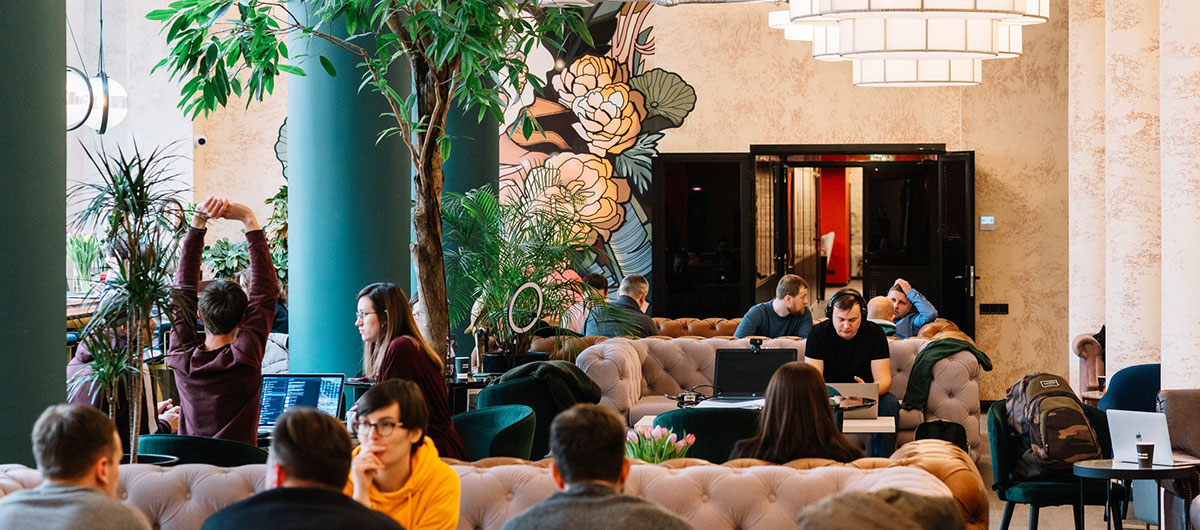There are nearly 100 flexible office spaces in Ukraine, 70% of them are located in Kyiv. The largest operator is IWG, with its 12 business centers, followed by Creative States with 5 coworking spaces. Like all Ukrainian businesses, coworking spaces found themselves in a situation of uncertainty and constant risk. However, despite all the difficulties, they mainly continued their business.
This guest post is written by Helena Sorokina. She is marketing associate at andcards, in love with modern coworking management software solutions, business development, literature, and everything in between.
Ukrainian coworking industry at the beginning of the war
Focus on security: When the war started, the most essential goal for operators was security because the life of their employees and customers was at risk.
Critical lack of customers and staff: Due to life threatening risks, the first 100 days of the war turned into a time of great migrations. More than 5 million people have resettled to western Ukraine and European countries. Many space operators started to lack clients and employees.
Feverish market: Additionally, the uncertainty damaged Ukraine's economy including the flexible workspace market. No one knew when customers and employers would come back and how to run a business during a war. Of course, everyone was concerned about the future:
"Our main business, coworking, is experiencing hard times. After all, constant air alarms and the danger of airstrikes do not allow residents to deeply focus on work. So far, most of our coworking space is empty and waiting for better times. We believe that our country will win this war and that coworking services will be in full swing very soon." — Feliks Volkov, the founder of Cherdak
Pre-war contracts with landlords: Since pre-war contracts were still in effect, operators' survival largely depended on their ability to reach agreements with landlords that minimize the cost of maintaining vacant sites.
Ukrainian Coworking Industry eight months later:
After eight months of war, the coworking industry has adjusted to a new reality.
Utmost flexibility:
Coworking operators optimized spaces to meet the needs of customers and invent more flexible plans, like a desk for a day or a room for an hour so that everyone can use their services.
Expanded audience: With many people moving to the west of the country, coworking operators expanded their audience to reach those who have not left yet or returned and new developments were considered.
"Starting from October, when Kyiv and Dnipro faced the first black outs in Ukraine, the Creative States locations are full of residents since those days and still are visited by lots of people. In such conditions they are searching not only for stable Internet connection and the electricity, they are looking for the vibes of calmness, stability and safety — today it`s the main request of the residents. And in Creative States we are happy to provide people with it” — Ilia Kenigshtein, CEO and founder of Creative States
Introducing new technologies: Many operators adjusted their business organisation. They automate customer journeys and workflows and sell more products online to external customers through external apps. This optimization helps fill staffing shortages, saving administrators time and effort. Tasks such as billing, membership plans, desks and meeting room reservations, Wi-Fi, access control, and more that used to be managed by administrators are now managed by online technology.
A growing interest in well-equipped offices:
Every week, more and more people return to Kyiv, leading to a growing interest in ready-made offices while current tenants are negotiating new terms.
Revival in Western Ukraine: Speaking of western Ukraine, many companies, mainly IT, moved to Lviv, Ternopil, Zakalpatia, Chernivtsi and Ivano-Frankivsk regions due to the war. The traditional real estate market in those cities couldn't fully meet the increasing demand for high-quality and well-appointed offices. Local coworking space operators could benefit from it and attracted new clients.
In addition: “Volunteers or those who defend Ukraine on the information battlefield can use our workspace absolutely free of charge.” — Oksana Kachurivska, Head of Diia. Business Center for Entrepreneurship Support in Ternopil
Focus on security: Today, the focus on security has retained its importance. Most coworking spaces are equipped with bomb shelters, and this trend will continue. This is declared at the government level. Our President Volodymyr Zelensky signed the law making bomb shelters mandatory in every new residential building.
How you can support coworking spaces in Ukraine:
Some positive industry trends are surely tracked, but most Ukrainian coworking spaces are still on a long way to their pre-war metrics in terms of the number of residents at their locations. According to andcards research, average space occupancy is nearly at 50%-60%.
The war is still going on, and they still need the global community's help. Here are two simple ways to help Ukrainian coworking spaces.
1) Follow this link and choose a space from the list to support it directly by booking a desk or a room.
2) Or send a transfer to the Ukraine Coworking Association. They will then distribute these funds to the workspace with the highest needs. The process is very quick and simple with SEPA or SWIFT transfer:
IBAN: NL45BUNQ2069307336 - BIC/SWIFT: BUNQNL2AXXX - Currency: EUR - Recipient: Ukraine Coworking Association
A small donation like this may seem peanuts, but for some coworking spaces, it’s a matter of life and death. Every cent counts and is much appreciated. Together we will win!








